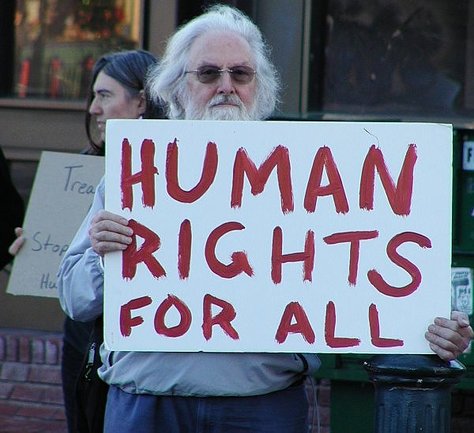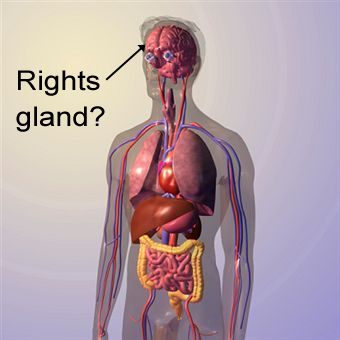Making Sense of Rights

I get horribly frustrated when people try to get me to change by employing semantic stop signs. There's probably no malice there; I assume people use terms without thinking too clearly about what phenomena they describe and how those things exist in reality. But it doesn't mean I have to like it.
One huge conceptual semantic stop sign which has probably led to the deaths of nearly as many people as organized religion is that of rights.
I have a right, you have a right, I have no right, you have no right. Rights (and duties) are problematic from a non-contractarian point of view. What does it mean to have rights? How can the existence of that something be determined? Since rights aren't something inviolable like gravity, of what use is it to claim that they are natural or inalienable?
The contractarian position has far less problems, but is still wrong as commonly stated. I adopt something which could be lumped into a quasi-contractarian camp, but which avoids the "starting problem" or the need to imbue the state or body politic with some sort of special power.
Human languages are imperfect conveyors of concepts; definitions change over time by the accumulated mistakes by of interlocutors. Current normative terms lie in a self-referential and conflicting morass and wobble or outright pop when one tries to pin them down.
I'm going to attack two different theories of rights and their closely related cousin, duties. Both natural rights and the social contract have some merit, but ultimately fail to account for how rights operate in The Real World™. I'm not here to debate terms, I'm here to figure out what phenomena exist and how they fit into the rest of existence.
I'm not even going to tackle god-given rights except to say: first, prove God exists (without appeal to something which is explainable by evolution). Secondly, explain how you know which rights God grants. Thirdly, explain how that's not just some arbitrary ruling by god and thus still subjective. Though honestly I'll be so impressed if you do the first two that I'll let the last one slide.
Usage: What does it Mean to Have Rights?
Rights certainly feel like something which one has; they have a tangibility when experienced subjectively. However, the subjective experience can mislead. Impossibility feels like a "thing with weight" as well but explain to me how the outside world produces an observable "something won't happening" state. Just because something feels real doesn't mean it's real outside of your own mind.
So let's taboo the word rights and see what else can fit in the "I have a _______" template.
For instance, while someone might think that rights mean "those states of affairs which are correct or proper," the sentence "I have a state of affairs which is correct or proper" doesn't make much sense. I'm looking for one or two nouns maybe modified by an adjective.
The dictionary shows just how confused people are†. Here are the given normative and quasi-normative definitions:
- morally or socially correct or acceptable
- being in accordance with what is just, good, or proper
- being in a correct or proper state
- most favorable or desired / preferable
All four of those do not fit into the "I have a _________" template.
Some further digging in a different dictionary reveals
- a moral or legal entitlement to have or obtain something or to act in a certain way.
That's pretty much what I was looking for.
Attempt 1 : Entitlement
If you want to see just how self-referential language is, just look at the first definition for entitlement
- the condition of having a right to have, do, or get something (So right = entitlement = right? Real useful, Merriam-Webster.)
- the feeling or belief that you deserve to be given something (such as special privileges)
The second definition is how people who make a distinction between rights and entitlements seem to classify those they consider whiney.
Maybe I'm looking at definitions which were recorded too recently. Things sometimes continue in a straight line and I'll accept that people keep using "that" word only half aware of how it was used before.
A search on Etymology Online reveals
- "that which is morally right, duty, obligation," also "rule of conduct; law of a land;" also "what someone deserves; a just claim, what is due; correctness, truth; a legal entitlement, a privilege,"
Damn. No luck there. Time to really try to break this word down.
En-titled. Starting with the en prefix:
- a prefix occurring originally in loanwords from French and productive in English on this model, forming verbs with the general sense “to cause (a person or thing) to be in”
Okay. I can live with that. "To cause a person to be titled." Throw on -ment
"the action or result of what is denoted by the verb".
and we have a definition which fits in the template
"I have a state of being titled (to/from X)"
With that out of the way, let's look at how such a thing could operate here on the ground. To be titled, either someone or something must be giving you a title or it must be innate somehow.
If it's the former, who is providing the title? I have some experience in these conversations about rights and the three most popular answers to the posed question are:
- God
- Nature
- Government
From God?
Note that I didn't disprove god as a source of rights, but I'm straight up considering goddidit™ an invalid argument unless I'm given evidence. I could claim to be entitled by a unicorn or some out-of-vogue god like Odin, but I don't think I'd get many people to buy into it. Show me god without pointing to something explainable by evolution, or playing word games, then we'll revisit it.
From Nature?
Nature "says" a lot of things. For every example you point to of animals defending territory, I can point to one of animals killing and taking territory. For every example you point to of parents lovingly rearing children, I can point to rape. Nature in general, and genetics in particular, only "cares" about "what works" - in this case defined as what replicators make it into the next generation.
The naturalistic fallacy exists for a reason: lots of things are natural and it doesn't mean they're good and vice versa: e.g. anthrax and synthetic fleece in winter. Anthropomorphizing nature has led to smart people believing things which effectively amount to magical thinking.
What about human nature? That supposedly doesn't change, right? Nope. That'll change with the environment too as those who don't "get with the program" have less children. While we rarely see humans going extinct for not toeing the line (at least in first world countries), they are less likely to find mates and reproduce. If there are genetic dispositions, such as those which lead to docility toward rulers, which enable humans to reproduce more prolifically in modern society, then those dispositions will eventually become prevalent in the population effectively changing "human nature." Despite sensationalist media stories, (individual) violence has been on a steady decline. Whether or not that has a genetic component remains to be seen.
Still, there are certain traits which social creatures like humans have which appear to be changing slowly if at all, but not all of them are ones which natural rights advocates would say should be enshrined. For instance, cooperation when convenient and fucking others over when more convenient. There's a reason why children learn to lie and screw others over so easily - it worked in the past... and that brings up another problem with basing rights on human nature.
Either one needs to ditch intuitionism or justify the distinction between "good" human nature which leads to survival and "bad" human nature which leads to survival. Sure, everyone can't lie all the time, but deception can and certainly does aid in the survival of individuals and their genes. It could even lead to the survival of societies when engaging in battles or other struggles with different societies. When dealing with the aliens in Independence Day it saved humanity.
Survival
If "what works" is defined as survival or flourishing, then what is the unit which one is looking to survive or flourish?
- Lines of DNA
- Individuals
- Societies
- The human species
Since each of those things have different means which maximize their survival or flourishing, it follows that any rights which maximize flourishing of each of those units will vary. Going with Lines of DNA could make rape or starving your children (to harden them) okay. Going with individuals matches our general intuitions. Going with societies might lead to more authoritarianism and war. Going with survival of humans might greatly restrict a lot of freedom.
Happiness
If happiness is the goal, the one should go into the experience machine and be done with it. Presuming you'll be safer and less unhappy in there, that's what you should do, right? Would others be unhappy about you "wasting your life" in a machine? Kidnap them and hook them up too!
However, some defenders of natural rights — including some liberals — have a more sophisticated view of natural rights. As noted above, they argue that rights are intended to promote survival. That is, rights are an attempt to form a high-functioning, smooth running society. According to this idea of natural law, our rights ought to be based on the laws of science, like game theory and economics. For example, a slave-owner gave a slave the right to eat for economic reasons, because the unnecessary death of his slave would have disrupted his business. However, in later centuries, we learned that giving all individuals a greater degree of freedom resulted in an even more prosperous economy, so we freed the slaves. The progress of science and economics is constantly improving our idea of rights.
The argument continues that if we could somehow learn the true laws of science and economics, we could fashion a perfect set of rights that would maximize our well-being. One could call these scientific laws "the laws of nature," or "natural law." A good analogy is math. Humans have only a limited and imperfect understanding of math laws by which the universe operates. But if humans could ever learn these math laws, they could dramatically improve their lives.
The problem with this more scientific view of natural rights is that it explains both everything and nothing at the same time. To say "the laws of nature should dictate our rights" is like saying "the laws of physics produce all the different species in the animal kingdom." By itself, this observation is not meaningful. It doesn't explain why some animals become rabbits and others become tortoises. Like species, rights vary considerably over time and region. A more practical explanation is that societies adopt their unique rights in order to meet their peculiar survival demands. Rights have improved with science, to be sure, just as human breeding of animals has improved with science. But that does not explain 100 percent of the diversity among species, any more than it explains 100 percent of the historical diversity among rights. Different environments have different survival needs, and this results in diversity, for both species and rights.
I bet the contractarians are happy at this point. I'm asking tough questions of natural rights / god-given rights theorists. I consider both of those philosophies to have been plaguing humanity since at least the time of Locke. You could say humanity has been Locked into thinking that way.
(•_•)
( •_•)>⌐■-■
(⌐■_■)
Well, now that you've got a good chuckle, the (government) contractarians are wrong too.
Government?
|
I want to put the Kibosh on the social contract fans before they jump for joy. Rights do not come from a government, at least directly. I have an example and a thought experiment.
The example is that numerous pre-government tribes didn't slaughter themselves (slaughtering others is a different story). Somehow people worked together without a formal leadership institution. Sure, there were often alpha males but dissociation was usually respected though not always circumstantially possible; such social arrangements were much more voluntary than they are today with all decent land being claimed. There are still plenty of small tribes which, though they may have hierarchy, don't have a government. I'm sure those people would still assert that they had rights. If your claim is that government needs to exist for rights (not the enforcement of rights, the title itself) to exist, then by what mechanism does the government have or obtain that power? If democracy, then isn't that people entitling the government? |
Or, we can go the complete other way. If Somalia is a libertarian paradise, then North Korea is a statist paradise. The government effectively inheres in The Dear Leader and if he says you don't have a right to be free of a blood debt, then I guess you don't have that right.
If you feel uncomfortable about either of those, then I've probably done my job here.
For the thought experiment, I'll ask what you would do if you came upon a person in the wilderness. Would you kill them for their backpack? Even if you could get away with it? If no, then fear of government isn't what's making you good. Were you indoctrinated by the government to not kill or did you sort of figure that out on your own or have your parents teach you?The parallel between theists and statists is really amazing: in general both are looking for a higher power and are afraid of what might happen if that higher power doesn't exist.
In the end, rights-from-government is insufficient to explain how people act both in and outside of the presence of governments, it's an idea which doesn't carry much water. It also suffers a starting problem where one must either admit rights are useless for individual and social flourishing†† or admit they could exist pre-government or really stretch the term government to include an alpha male from whom people could dissociate.
Intrinsic Rights
In order to make a claim that an entity has a property or otherwise contains something else, proof must be offered. That proof needs to come from induction unless it's a tautology. Induction requires observation, and experience. How does one observe having rights? I'm not a dualist, so I demand empirical, material evidence. I did a search on Fisher Scientific's site for a rights detector, but couldn't find anything. I can measure the mass or length or volume of an item, but I can't measure something's rights - at least not in the same way.
To be fair, people hypothesized the shape of the atomic structure before they could observe it semi-directly. It's possible for reality to strongly hint at the existence of an entity by observing effects. What are the effects of rights? We experience the effects of rights in the sense that we (or others) make rights claims that others respect. We see an increase in what many consider social benefits in societies where individuals claim to have certain rights. We experience a belief in rights in the sense that we feel entitled to things.
It appears that something is going on. However, indirect observation does not, by itself, justify postulating an entity. One needs to predict, and one should be Somolonoff-friendly by making the fewest assumptions possible. If the experiences can be more simply explained without an entity or by an entity with different properties, then that's what should be assumed first. Free will is a good parallel. We experience will which appears, to us, to be completely self-initiated. Individuals and societies whose members feel actualized by claiming they have free will do "better" than those who don't. Yet this phenomenon cannot and does not exist unless everything we know about pretty much everything else wrong. What's more likely? Humans who fall for magic tricks are wrong or every experiment ever is giving us false information?
|
So, do the effects of things humans call rights most strongly point to the existence of an indwelling property which humans contain? What about marginal cases like children and the mentally handicapped? They are human, do they also have the same rights? If not, why not, and it can't have anything to do with society or practicality; if something is intrinsic, that thing must be considered alone otherwise it's relational. So, in the case of children, it must be that their "rights glands" are immature or that rights are tied to intelligence in some consistent non-externally referencing way.
Let's say there's an entanglement between intelligence and rights. No matter which environment you drop the subject in, he cannot have certain rights if he's below a certain intelligence even if it would be helpful if he did have rights. Remember, convenience does not dictate truth. Take the example of children who were pretty much treated like mini adults in the past because society needed them to be responsible. Well, those children either had rights or didn't and, unless neurochemistry has changed since then, children of the same age or intelligence also have the same rights. So, if an 8 year old had the right to enter into a contract in the 18th century, then a comparable 8 year old does today. The only other way to tie intrinsic rights to circumstance is to make it an intrinsic disposition. For instance, the skin of most humans will darken if exposed to sunlight. That doesn't mean one has dark skin, but it does mean that one will have dark(er) skin after exposure to sunlight. The problem for those arguing for intrinsic rights in such a manner is that it makes rights circumstantial. I mean that's pretty obvious: if rights are determined by circumstance, then they are circumstantial. In such a case you don't have rights, you have a propensity for rights in certain situations and can only be said to have rights under those conditions. |
So, rights existed before formal governments and continue in instances where government is powerless to enforce them. Well, if rights don't come from god, or from nature, or from pure deductive reasoning, or government, where do they come from?
Until I am offered tangible, empirical, evidence that humans contain these things called rights in a non-circumstantial way, I'm ruling out definition 1c as sensible regarding rights.
Deduction
The great thing about non-normative premises is that they appear to have an acontextual truth value. In actuality, they have a single shared context called reality! Not so with normative premises because one can always ask "why?" or use the open question. So an unjustified value-laden premise must be snuck in somewhere. Unlike descriptive axioms, it's easier to disagree and harder to offer proof that something is actually good. Damn you, Hume! But let's pretend that down is up and black is white and that one can "purely" and justifiably derive normative statements without reference to other norms. What does that get us? Something like math?
Rights as What Works
Here's the immediate problem with that: there are lots of things which natural selection allows which natural rights theorists would say aren't rights. Further, natural selection is a circumstantially-dependent process because it selects on different specific traits depending on the environment. Tying rights to "what allows survival" is really tying it to "what works in any given environment."
People might try to then claim that the human environment hasn't really changed that much, but that's a dubious assertion. For instance, most small tribes are much more egalitarian and voluntary than large societies. Why? I'm guessing because large societies simply can't be voluntary (at least in the way an-caps want) because the number and complexity of the relationships are simply too great.
Even if there are commonalities in the types of environments humans will find themselves in, that's different than raising the bar to something which works in all environments. Critics are quick to offer up numerous life boat scenarios and, while rare, the only recourse of the "all environments" natural rights defender is to get indignant.
Why Care?
If things are logically derived, there's no need to take into account fuzzy circumstances. Math certainly admits of no such thing. Why not just kill all people who steal even if it's food to feed their children? Why weigh individual circumstance at all? It requires pulling in pieces outside of the logical derivation or adding so many clauses as to make it very vague.
Definition 1a can still be held, but no specific rights fall out of it. I could have a right to life or a right to be a contestant on The Price is Right.
Simplify, Simplify
To further simplify, ask if there's any difference between rights not being respected and them not existing. If both of those scenarios constrain expectation in the same way then there's no need to separate them. If one is unable to state a single, non-semantic difference between those two states then they are epistemically not different.
The Stupid, but Close, Contractarian Position
Sensible Rights
|
Why can't rights just come from one another? Is that really so scary? Rights are respect. Say that over and over again. If I fear or love you enough to not kill you then you now "have" (per definition #3) a negative right to life. If I fear or love you enough to undertake some duty for you, you now "have" a positive right to whatever that is. No government required. No god. The only natural (not-man-made) part in this whole thing is that we can love or fear one another and communicate and are predisposed to congregate and cooperate with members of our own species - all of which have genetic components.
What does that mean for the common conceptions of rights? |
- Rights are only constrained by the practical. There are no other limits on what can and can't be a right. You can have a right to blue jeans or for people to not swear in your presence or any number of things. Negative rights tend to be cheaper to grant, and thus more likely to actually exist.
- Rights are transient and alienable. There's nothing which says that respect must continue indefinitely and in changing conditions. As soon as respect stops, you stop "having" rights.
- Rights are contextual. Rights are contextual to a respecter. It's possible to both have a right to life and not have a right to life simultaneously in a group containing three or more agents.
- Government can foster or undermine rights and can indirectly create rights. While rights ultimately come from individuals, government can increase fear of consequences or run indoctrination campaigns to garner respect or disrespect for certain things. This individual respect then becomes rights. Thus the government doesn't directly deal with rights but can change the conditions under which people respect others.
- Rights don't exist without respecters around. If you're alone with no other agents around, you don't have rights - you have abilities. You can be a respecter and grant trees and rocks and bees rights if you want. You can scare bears away from your camp site and then have limited rights in their context if they learn to leave you alone.
- Different agents can have different rights and institutions can have rights which differ from the constituent agents. Many libertarians claim that the government can't have rights that the individuals who created government don't have. Bullshit. The institution of government and agents acting in the role of government can be granted different or additional rights by individuals.
Wait, what About Consent?
The objection is not important because the solution is the same - get more power or make sure others have less power. Still, I can let the objection stand to point out that identifying with the powerful is especially dangerous.
If a gang is terrorizing the neighborhood, it's easy to understand why people don't grant them a right to do that. When police are terrorizing the neighborhood, people seem to grant them that right for reasons other than fear. Fear may have been the initial cause but I think, in most cases, it's an identification with such public institutions which rests on the lie of "the government is the people" and parasitically attaches to a predisposition to look for tribal alphas. Larken Rose calls this The Most Dangerous Superstition. Because people are okay with some police doing the same horrible things which gangs do, the police have a right to do it (in the context of those people) even if the gangs don't.
Value is expressed by action. To acquiesce gives the appearance of consent and that's what matters. If you don't consistently call people out or make it costly for them, expect it to continue.
Wait, Wait! So if those are Rights, What are Privileges?
What about Duty?
I don't have a right, others respect my doing something. I don't have a duty, others expect me to do something. I can do that something or not and am not wrong in some non-subjective absolutist way for failing to perform or conform. The social contract as it's commonly presented is just as false and lazy an idea as natural rights are.
Why this View Matters
More importantly, I feel this view matters because I really want people to understand power relationships. The less necessary you are to another, the less reason they have to love you. The less power you can bring to bear to get them to consider your desires, the less reason they have to fear you. Without love or fear, why would they respect you - why would you have rights in their context?
People should recognize this because, unlike all the talk of self-evident rights, the mechanics of this are patently obvious. Yet all sorts of magical thinking continues. People believe, for instance, that if they can just utter some cryptic phrase or fill out the right documents the IRS will leave them alone. Hell, the law may even be on their side... but the law doesn't matter if people don't respect it. "Ze paper" cannot give you rights by itself. Instead of focusing on how to get people to view taxation on wages as a moral wrong they tie themselves up in ineffective knots looking for the political alchemy which will transmute their IRS debts to mere annoying letters. They travel down a rabbit hole filled with gold-fringed flags, upper case letters, their person being a corporation, rather than just telling the IRS to fuck off and living their lives by working around the IRS.
"Castle Libertarians" think that they can live well without society and the ultimate affront is to not be left alone even when that's not reasonable to expect from others. They should realize that their property is as flammable as a poor person's property and that the fates of humans in a geographic or cultural area tend to rise or fall together.
It's hard work to change hearts and minds or to neutralize others. It took Martin Luther King Jr. to get people to love others and Malcolm X to get them to fear others. What came out of that? Respect - and thus rights. It's easier to pretend that there's some easy answer - that there's a weight loss plan that requires no lifestyle or diet changes, there's a "superman" waiting in the wings, there's a god looking out for humans. That's ignoring reality. If you want to be an effective change agent, you must first embrace the truth about the costs so you can own your values.
†† Because how'd people survive long enough to make a government if they were constantly stabbing one another in the eyes and stealing their Nikes?




